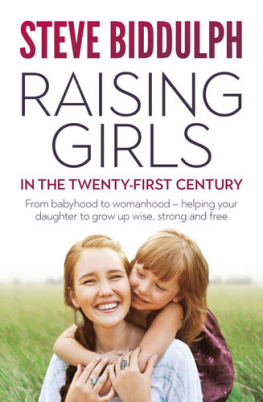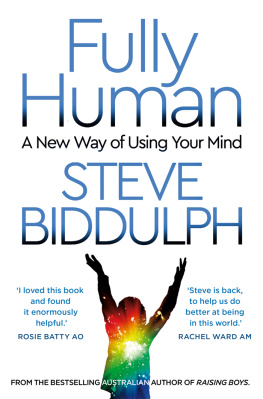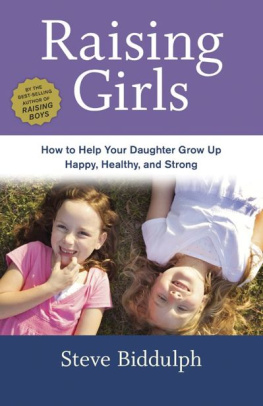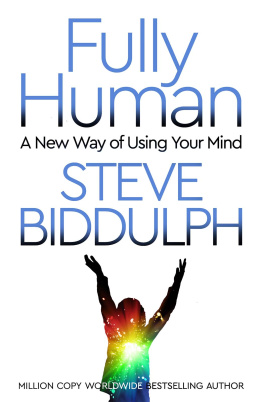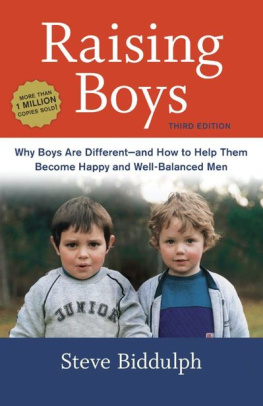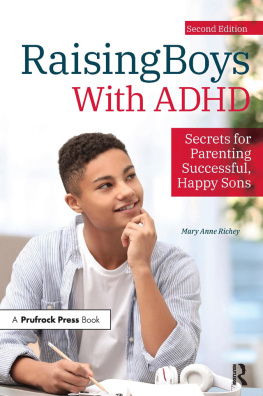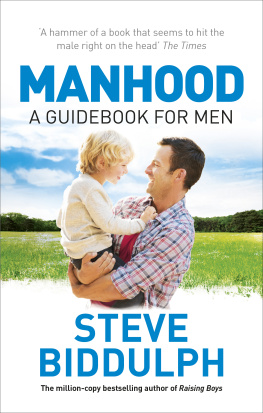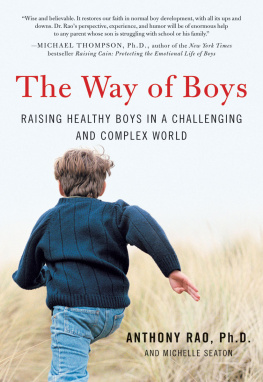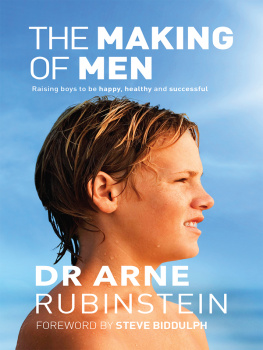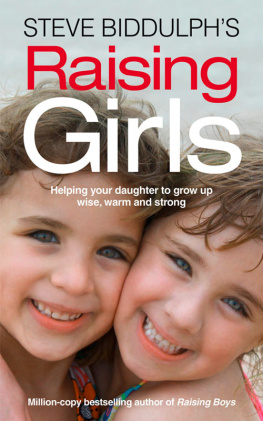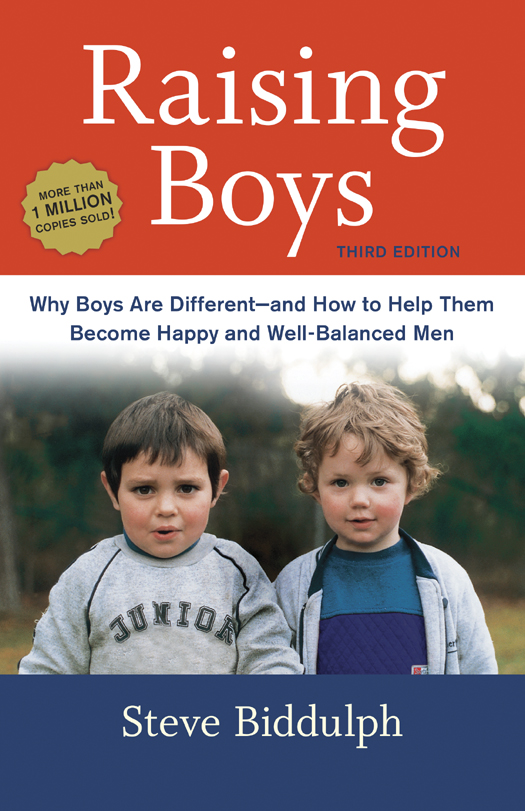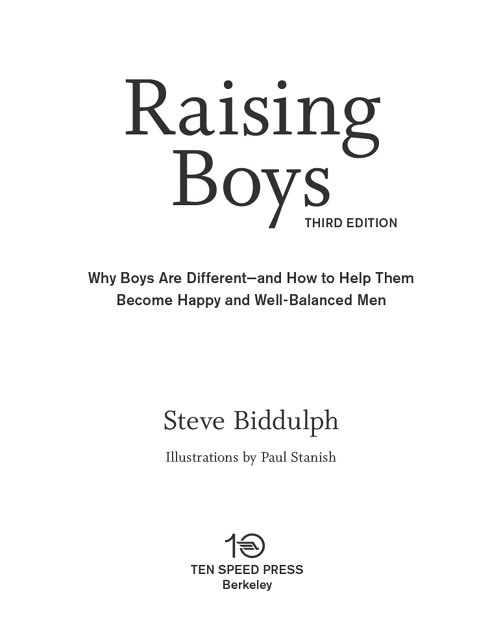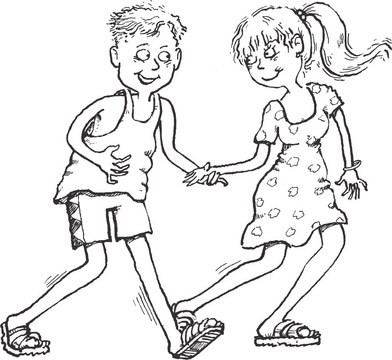Copyright 1998, 2003, 2008, 2013 by Stephen and Shannon Biddulph
Front cover photo courtesy of Steve and Shaaron Biddulph
All rights reserved.
Published in the United States by Ten Speed Press, an imprint of the Crown Publishing Group, a division of Random House, LLC, a Penguin Random House Company, New York.
www.crownpublishing.com
www.tenspeed.com
Ten Speed Press and the Ten Speed Press colophon are registered trademarks of Random House, LLC
Editions of this work were previously published in Australia by Finch Publishing, Warriewood, in 1997, 2003, 2008, and 2013, and subsequently in the United States by Celestial Arts, an imprint of Ten Speed Press, Berkeley, a division of Random House, LLC, New York, in 1998 and 2008.
The author gratefully acknowledges the permission of the following for the right to reproduce copyright material in this publication: What Fathers Do, by Jack Kammer, is reprinted from Full Time Dads, May/June 1995, with the permission of the author. The segment of the article, Mid School Crisis, by Jane Figgis, is reproduced with the permission of the Sydney Morning Herald.
We are grateful to the following people for their assistance in providing photographs for this book: Paul and Judi Taylor, Narelle Sonter, Jim and Jenny Smith, Elia and Tony Wallace, Geoff and Chris Price, Glenda Downing, Chris and Tony Collins, Catherine James and Bruce Stephens, Ella and David Martin, Steve and Shaaron Biddulph, Glenys and Brian Atack, Steve and Henrietta Miller, Miles and Jane Felstead, Suzanne Jensen and Ral Lewis, Wendy Pettit and Currembeena School, Robert and Sue Holloway, Dave Hancock, and Tony James.
Library of Congress Cataloging-in-Publication Data is on file with the publisher.
Trade paperback ISBN: 978-1-60774-602-7
eBook ISBN: 978-1-60774-603-4
Cover design by Steve Miller/Snapper Graphics and Colleen Cain
Interior design by Greene Design
Interior illustrations by Paul Stanish
v3.1
Contents
Appendix B: How to Tell Whether a School
Is a Good One for Boys
Preface to the Third Edition
Ten years ago, boys were often seen as a problem. Too noisy, too energetic, slow learners, poor communicators, a danger to everyone, and then they turn intomen! But those of us who worked with parents and their boysor had boys of our own and loved them dearlyknew this wasnt right. Important truths needed to be rediscovered. Boys were different, in important ways. New research was telling us some remarkable things about boys brains and bodies. And by understanding their psychology, their stages and development, their hormones and hard-wired natures, we could raise them to be fine young men: safe, caring, passionate, and purposeful.
The first edition of this book took off around the globe like wildfire. In Australia, New Zealand, the UK, Germany, Brazil, and Japan, it was a best seller, but more than that, it was beloved. It was kept on bedside tables, dog-eared and much visited. People urged their friends to read it. Women nudged their husbands in bed and said, Listen to this
Boys have real dangers in their lives. They are three times more likely to die before the age of twenty-one, and five times more likely to have problems at school compared with girls. Millions of boys have poor life chances because we have failed to understand and love them.
But with the new realization of boys needsfor exercise, for warm and firm relationships with mothers, for fathers and other good men in their lives to be active and engaged, for schools that know how to teach in boy-friendly wayswe can save them still. We can raise a generation of boys who are happier, more alive, more connected to the human race, just in time for a world that so badly needs good men.
Boys are fun. They make you laugh. They are full of life and can share that energy with you. They also touch your heart; they are deeply feeling. So we have tried to put all those qualities into this book as well. Whether your son is a tiny baby, a schoolboy, or a teenager surging with hormones and hopes, this book has something for you. I wish you much joy.
Steve Biddulph
CHAPTER ONE
What Is It with Boys?
Last night, I drove into town for a meeting, or at least tried to, and the situation with young men was once again thrust into my face. Three cars ahead of me, the highway was blocked. A sedan, driven by a seventeen-year-old boy with four friends in the car, had attempted to pull out into traffic but miscalculated. A truck coming up behind had hit the car and carried it fifty yards along the road, badly crushing the vehicle in the impact. Soon, the emergency vehicles arrived: fire, rescue, police, ambulance. Men worked in teams, calmly but rapidly dealing with the situation.
The young driver, unconscious, was gradually cut out of the wreck. His four male passengers had varying injuries, some serious. An older woman, perhaps the mother of one of the boys, came running from a nearby farm. A policeman gently comforted her.
Maleness was everywhereinexperience and risk on the one side; competence, caring, and steadiness on the other.
It kind of summed up for me the male situation. Men, when they turn out well, are wonderfulselfless, heroic, hardworking. But being young and male is a condition so vulnerable, so prone to disaster. When we see a boy born these days, we cant help wonderinghow will he turn out?
Boys at Risk
Thirty years ago, it was girls everyone worried about. Across the world, a huge and spirited effort was mounted to raise the horizons of girls, to give them confidence that they could do anything they wanted with their lives, and to demolish the barriers to their achievement. And its working; today, its the girls who are more sure of themselves, motivated, and capable. More girls than boys finish school, more girls go on to college, and they get better grades than boys do.
Parents of daughters find that they are focused and clear-headed, and know where they are going. Boys, in comparison, often dont have a clue. They seem to be adrift in life; failing at school; awkward in relationships; at risk for violence, alcohol, and drugs.
The differences start earlyvisit any preschool and see for yourself. The girls work together happily; the boys gallop and whoop around. They annoy the girls and fight with each other. In elementary school, the boys are easily distracted and often struggle to keep up. Teachers spend all their time subduing the boys, and the girls miss out on attention. By the time they reach third grade, most boys dont read books any more. Many speak in one-word sentences: Huh? Awwww-yeaaah! In high school they dont participate in debating, concerts, student councils, or any nonsports activity. They pretend not to care about anything.
In the relationships department, teenage boys are quite unsure about girls and how to get along with them. Some become painfully shy; others are aggressive and unpleasant. They seem to lack even the most basic conversation skills.
And the bottom line, the thing that puts a knot in our stomachs as parents, is of course safety. Between the ages of fifteen and twenty-five, boys are three times more likely than girls to die, usually from accidents, violence, and suicide. Three times more likely to die! And for every boy who dies on the road, ten more are left brain damaged or wheelchair bound, the hidden casualties. Every parent of a son feels that fear when their teenage son goes out with his friendswill he come home safe and sound?


